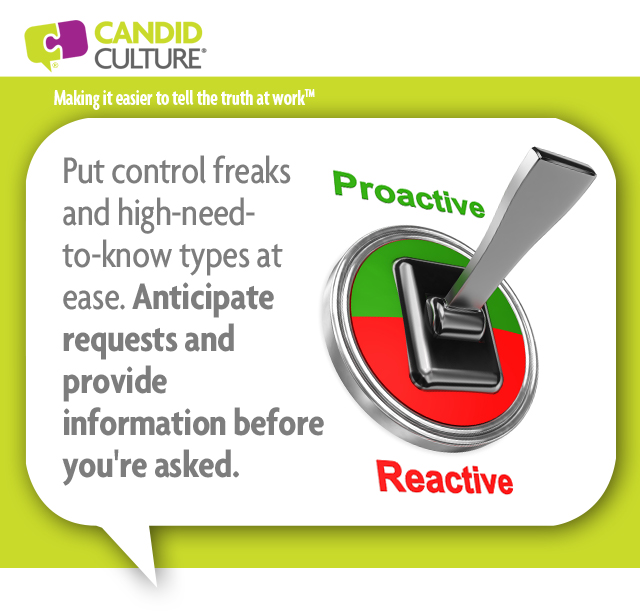Manage Control Freaks

Frustrated by a control freak, micromanager, or a high-need-to-know type? Controlling behavior stems from a need that isn’t being met. Identify the need, meet it, and your life gets easier.
This is similar to what sales people learn during good sales training. The customer wants to buy the car but doesn’t. She visits the dealership three times, but just can’t pull the trigger. She has some sort of a concern. If the sales person can identify the concern, he can possibly resolve it, and sell the car. Working with control freaks is the same.
If someone wants more updates, information, or involvement than you’re comfortable with, he has a need that isn’t being met. When you meet the need, the person will likely back off.
I ask the people who work for me to never make me ask for something twice. Meaning, if I ask for an update the week before a speaking engagement, anticipate that I’ll want that information for all engagements. Confirm by asking me and then provide the data without being asked for all future engagements. Getting the information regularly without having to ask builds trust and credibility.
Here are six tips for working with control freaks:
- If you don’t know, ask:
- Their work-related goals.
- What the person is concerned about at work.
- How s/he likes to communicate – in-person, email, phone, voicemail, or text.
- How often s/he wants information, in what format, and with how much detail.
2. Provide more information than you think you need to, and then ensure the person wants that information in the future.
3. If you’re asked for information, ask why the person wants it, and if s/he wants it in the future. Then provide the information before you’re asked.
4. If someone is overly involved in your work and you feel you have no freedom, state your observation and ask for information. That could sound like, “You’ve been involved with each major decision with this project. I’m used to working with less oversight. Do you have a concern about my approach?” Then you negotiate. Everything is a negotiation.
5. This will put the other person on the defensive. A less confrontational approach is to discuss and agree upon levels of involvement and supervision when projects begin. That could sound something like, “What kind of involvement do you want to have in this project? What do you want to do? What do you want me to do? What kind of updates would you like, how often, and with how much detail?” It’s always easier to prevent a problem than to fix one.
6. Lastly, don’t take anything personally. Oversight and involvement may be a reflection of how someone feels about your performance, but it might not. When in doubt, ask.
Tags: building trust, control freak, control freaks, micromanagers, personal brand, relationship building, reputation, trust








Some control freaks just want to do it all themselves. No matter what attempts you make to communicate, get feedback, etc. they don’t respond or they begin limiting your access/ability to contribute. I’ve worked with a few like this. In one case, they were eliminating my position. In another, it was just fear at its worst. In this last case, I went to speak to the person face-to-face and simply said that the communication was simply not working and I needed clearer direction and more timely feedback to do well. Nothing changed wrt to their communications. To my face they were complimentary, but in practice, I found them to be undermining my role. I felt the arrangement was dishonest from the start. I am no longer associated with that organization. That was a very frustrating and disappointing experience.